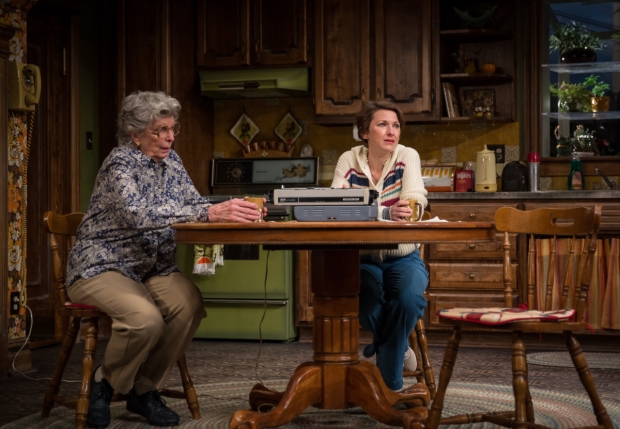Soups, Stews, and Casseroles: 1976

(© Liz Lauren)
Rebecca Gilman's Soups, Stews, and Casseroles: 1976 tells the large-scale story of corporate takeovers, the rise of automation, and worker disenfranchisement through a microscope's lens, focusing on the Dursts, a middle-class family in the fictional town of Reynolds, Wisconsin, in 1976.
Like everybody else in Reynolds, the Durst family's livelihood is tied to the Farmstead cheese-packing plant. Patriarch Kim (Cliff Chamberlain) has worked at the plant since he was 18. His wife, Kat (Cora Vender Broek), works the assembly line during the pre-Christmas rush. When Consolidated Foods, a major conglomerate based in Chicago, buys Farmstead, they make quick work of "streamlining" the workforce, cutting employees to maximize profits, sending a corporate manager named Jerry Marcus to oversee the transition.
Jerry, as it happens, moves into the Dursts' neighborhood. Kat, the "neighborhood welcome wagon," is quickly enchanted by Jerry's wife, Elaine (Angela Reed). Elaine slithers into the Durst's lives with sparkling earrings and tales of the glamorous life she left behind in Chicago. Soon, Kim is offered a promotion to floor manager as many of his friends are let go, and he is caught between the chance to support his family and to show loyalty to his community.
As Kim Durst, Cliff Chamberlain projects a simple goodness that makes it easy to root for his rise to the top, while still hoping for his better nature to win out. During one morally precarious scene in Act 2, there was audible muttering and encouragement from the Goodman's opening-night audience. Credit is due as well to Cora Vander Broek as wife Kat, whose transformation due to her friendship with Elaine unfolds organically. As daughter Kelly, the 16-year-old with burgeoning social consciousness, Stock combines the mannerisms of her onstage mother and father wonderfully, tying together a believable family unit. The familial chemistry, especially between Stock and Vander Broek, is potent.
Angela Reed is clearly having fun playing the boozy Elaine, who masks her vulnerability with self-help platitudes, insisting that Kat read I'm Okay, You're Okay and singing the praises of her assertiveness training course. Ann Whitney's substantial comic chops are not wasted as JoAnne, who doles out harsh judgment and sound advice while organizing recipes from the Homemakers' Club's annual cookbook: the titular Soups, Stews and Casseroles: 1976. Rounding out the cast, Ty Olwin is charming as Kyle, the young Union President who is struggling to hold the line against corporate interests.
Robert Falls deftly directs Gilman's script, creating a cohesive ensemble with warm chemistry. Jenny Mannis' costumes highlight Elaine as a clear outsider, draping Reed in luxe jumpsuits and iconic Diane von Furstenberg wrap dresses. She is in contrast to the Dursts' restrained small-town sensibilities, popping out from Kevin DePinet's period-perfect set of harvest gold and avocado tones. Jesse Klug's lighting completes the look with gentle sunlight streaming through the kitchen window.
At one point in the second act, Kyle is advising Kelly on her upcoming debate team's regional competition. He tells her not to think of her topic — the death penalty — in terms of individual lives, but rather address only the larger moral imperative. Soups, Stews and Casseroles: 1976 does the opposite, taking a conflict that is still playing out in America and paring it down to a microcosm. It's very effective, and the result is a moving piece of theater.










